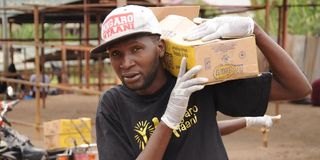Former street child sensitises homeless families on Covid-19

Sam Omoll during a distribution exercise of clothes, soap and sanitary towels to street families by Mng'aro Mtaani initiative.
What you need to know:
- Reformed street boy now behind an initiative which distributes new and second-hand clothes to families and street children as a way of restoring their dignity.
- Mng’aro Mtaani initiative has so far been able to distribute clothes donated by well-wishers to more than 35,000 Kenyans in five years.
At the age of nine, Sam Omoll had a different lifestyle compared to most children his age.
Instead of worrying about school and getting good grades, Sam and his friends, who were part of the group that scavenges the Dandora dumpsite, were concocting devious plans of how they will pounce on their next victim.
Their victims were mostly unsuspecting women from whom they stole handbags. This is the life he knew as a young boy.
At a tender age, he started collecting plastic bottles and scrap metal to sell, just to get a plate of madondo (beans) and chapati.
“I was born in Kariobangi South and raised by my grandmother in Korogocho slums. Since I was nine years old, I got into friendships with other boys who were part of a group known as the Dandora dumpsite scavengers. We used to collect metalic objects and plastic bottles who we would later sell,” says Mr Omoll.
“To make money for food, that was the life we knew. The world looked like a big maze; every day I was trying to find the way out… maybe to a better place than the dumpsite.”
With the surplus money they would make, the group rented a single room in Korogocho with each contributed Sh100 towards the rent. The rent was Sh600 per month.
The temptation to use drugs was overwhelming since drugs were more available than food.
Changed his life
“We used to get into fights with other gangs made up of street kids, to mark territories and the goodies at the dumpsite,” explained Mr Omoll.
He occasionally attended informal school but kept dropping out and going back to the streets.
However, it was through the intercession of a social worker from a local church in his area that changed his life.
“The Catholic Church played a big role in taking me back to school and shaping my life. I went to secondary school and later got a chance to join college by the help of World Vision Kenya through their orphans and vulnerable children programme and finally went for my favourite course, a Diploma in Mass Communication in the year 2007,” Mr Omoll added.
Mr Omoll is among the few street children who have been able to turn his life around.
After finishing school, Mr Omoll realised that he could use the little he has been able to achieve to empower others like him, including the many families in the slums who live in impoverished conditions.
That is when he started Mng’aro Mtaani in 2015, an initiative to distribute new and second-hand clothes to families and street children as a way of restoring their dignity.
“People in slums have so many problems that thinking about buying clothes does not make the top of the list.
The few clothes they have are threadbare and discoloured,” he said.
Mng'aro Mtaani
“The suffering, which I went through while growing up, pushed me to start the initiative. I used to go without decent clothing,” he said.
“I have realised that time wasted cannot be recovered. I have known that peer pressure is bad. Drugs and petty crime like taking people’s clothes from the hanging lines was a bad omen. These are these the regretable mistakes I made as a young man," said Mr Omoll.
Having been able to recruit some of the other street children from his circle of friends into the initiative, they have been able to distribute clothes donated by well-wishers to more than 35,000 Kenyans in five years.
But with the current coronavirus pandemic, he has now switched gears to giving out soap, sanitary towels as part of their health and sanitation programme.
Under their Covid-19 campaign #sabunindiokibokoyake, he, together with his team, moves around in Korogocho and Dandora slums to distribute bar soaps and also educate its residence on the importance of washing hands.
“We officially started the wash your hands campaign this year to support the government in sensitisation of the virus in the slums. However, most people here cannot afford to buy face masks, with some going for Sh50. They are torn between using the Sh50 to buy the mask or sukuma wiki and tomatoes for dinner,” stated Mr Omoll.
Besides, he is also connecting with street families to sensitise them about the Covid-19 pandemic.
According to a 2012 report by Unicef, Kenya has an approximately between 250,000 and 300,000 homeless children with the numbers increasing daily.




